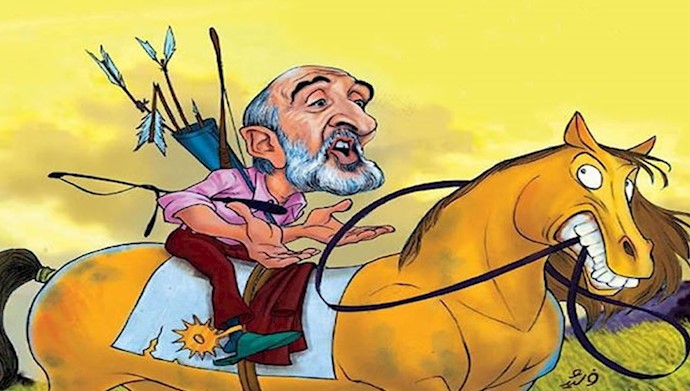Analysis by PMOI/MEK
Iran, April 18, 2019 – Following the blacklisting of the Islamic Revolutionary Guards Corps (IRGC), the regime in Iran rushed to claim that the new terrorist designation of its main economic/military arm has no impact on its power structure other than to unite all its opposing factions under one flag.
To back up the claim, members of the mullahs’ Majlis (parliament) attended a parliamentary session with IRGC uniforms, Friday prayer imam’s univocally supported the IRGC and even Iranian TV hosts appeared on shows wearing IRGC uniform.
But despite the ruling mullahs’ relentless efforts to put on a brave face, cracks of growing discord and outright fear, pessimism and disappointment among the regime’s forces are increasingly evident.
Recent reports about bringing in Iraqi militias into Iran under the pretext of helping victims of the nationwide floods is a strong indicator that the regime cannot fully rely on its domestic oppressive forces any longer.
Meanwhile, ridiculous plans about how to counter the blacklisting of the IRGC are aplenty.
Sadollah Zarei, a political analyst close to the Iranian regime Supreme Leader Ali Khamenei’s factions suggests that the mullahs should “decrease Saudi Arabia’s oil exports to zero.”
Taking his own preposterous suggestion seriously, he remembers the Iranian regime’s terrorist activities in Iraq and describes this approach as the right strategy to break the sanctions.
“Chances are high that as soon as the first part of Saudi [oil] exports is stopped, Europe and the Saudis will start discussions with influential American circles, such as the U.S. Congress, to stop anti-Iranian measures,” Zarei says, hoping that similar to previous U.S. administrations, the Trump White House will also buckle in the face of terrorism.
Nosratollah Tajik, a former Iranian diplomat close to Hassan Rouhani’s faction, ridiculed Zarei’s suggestion following its publication in the Keyhan newspaper, known as Khamenei’s mouthpiece.
“Keyhan’s proposal to decrease Saudi Arabia oil exports to zero is a joke. The region has become a powder keg. It just needs a spark. We need to take steps vigilantly. Such proposals are like playing into Trump’s hands. Trump wants to create a psychological war. The more we fume this war, the more its fires will run ablaze,” he warned.
He then acknowledged the popular discontent over the regime’s meddling in other nation’s affairs.
“Considering the country’s mood and the popular opinion and the region’s opinion, there is no capacity for executing such suggestions… We need to implement approaches that decrease the tensions in the regions.”
Fereydoun Majlesi, a former Iranian diplomat close to Rouhani’s so-called moderate faction, said the following about IRGC’s blacklisting.
“Referring a case to the United Nations while protesting the foreign oppressors is tantamount to inviting domestic politicians to respect international standards. Currently, one of the methods to go abide by international laws is to adopt bills such as FATF and join its conventions,” he said.
Masih Mohajeri, an Iranian cleric close to Rouhani, lashed out at the opposing faction’s solution to blacklisting the IRGC.
“We shouldn’t heed the advice of hardliners in this regard. This advice, even if well-intentioned, is not consistent with our revolutionary vigilance and are encouragements to fall into the enemy’s trap,” he said.
Mohsen Safaei Farahani, a former Majlis member, has grave concerns about the Islamic Republic’s crumbling economy.
“If our country’s economic conditions are not improved, this part of our sovereignty may also be damaged,” he explained.
He then considered conceding to and negotiating with the West as the only option.
“Why you want to deceive a sick individual who suffers from both lung and stomach cancer, his kidneys are in bad shape and his liver is also damaged with Gelofen, he will certainly pass away,” he warned.
In Iran, Gelofen is the common brand name of Ibuprofen and used as an analgesic and non-steroidal anti-inflammatory drug for mild pains, such as headaches.





